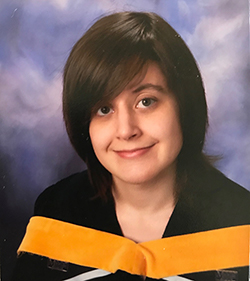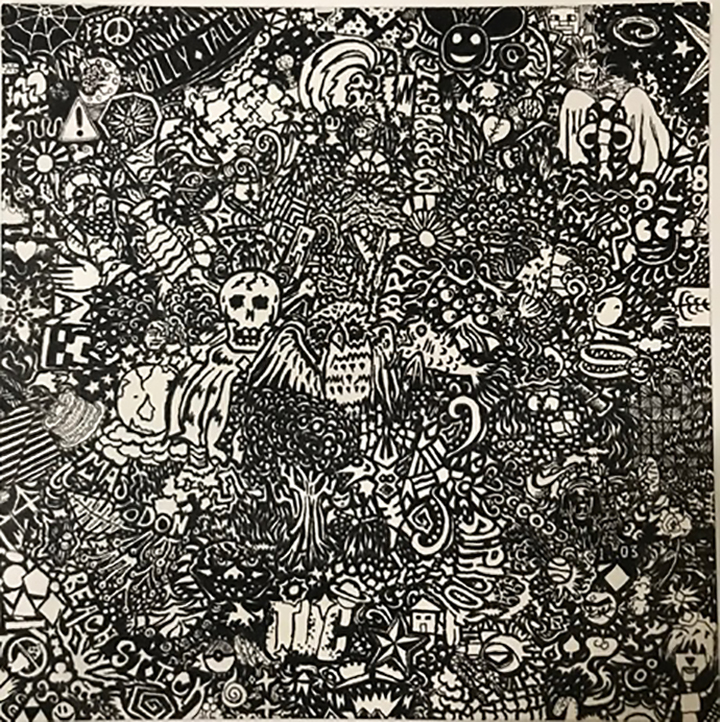Although the day is foggy and damp, Jamie Coolen’s refreshingly honest energy lights up the room. Having just come from a test (that she’s happy to report she “thinks went well”) and gotten back a term paper that she scored an A+ on (even though papers “aren’t her strong suit”), Jamie is eager to reflect on her time at the Mount.
Jamie is set to graduate this May with a Bachelor of Science degree in Biology with double-minors in Psychology and Chemistry. Supported by a renewable scholarship that she kept every year of eligibility alongside other accolades, her degree is more than a sign of her academic excellence. It is proof that she, like other students with high-functioning autism, is capable of doing whatever she puts her heart and mind to.
Top of her class
 Hailing from Whites Lake, Nova Scotia, Jamie was diagnosed with autism several years ago. Although her initial learning curve to read and write was steeper than for others her age, by middle school she was excelling academically. In high school, Jamie found success as both an artist and focused student. She decided to focus her university studies on science. Small class sizes, encouraging faculty and staff, along with an alumnae connection (her mother is a graduate of the Mount’s Bachelor of Business Administration program) are what drew Jamie to the Mount.
Hailing from Whites Lake, Nova Scotia, Jamie was diagnosed with autism several years ago. Although her initial learning curve to read and write was steeper than for others her age, by middle school she was excelling academically. In high school, Jamie found success as both an artist and focused student. She decided to focus her university studies on science. Small class sizes, encouraging faculty and staff, along with an alumnae connection (her mother is a graduate of the Mount’s Bachelor of Business Administration program) are what drew Jamie to the Mount.
With the support of family and the Mount’s Accessibility Services department, Jamie feels lucky to have been able to pour her energy into her studies. She has managed a full course load throughout her degree, including required lab components for some courses, and achieved high marks. “I’ve learned that I can excel in academic environments, and hope that people who told me I wouldn’t can see me now. I didn’t fail despite the odds I faced in this degree,” she said.
Jamie is a firm believer that others with autism shouldn’t be afraid to take on post-secondary education, especially with the availability of supports like those offered at the Mount. The Mount’s Accessibility Services department helps students identify and access accommodations and supports that are unique to their needs. They promote self-advocacy and an equitable learning environment toward helping each student to reach their full potential.
“You need to look at your academics and understand your strengths coming in to it,” Jamie advises. “If you want to do it, there’s no harm in trying.”
Breaking down barriers through art
Although living with autism has brought challenges, Jamie has let nothing hold her back from succeeding. And though she’s been busy with academics these past few years, she’s still found time for her artistic pursuits. She hopes to shatter biases about autism through her art, which takes many forms. Jamie’s drawings are intricate in nature; her pieces are detailed reflections of the world around her with some original inspiration mixed in.

One of Jamie’s completed art pieces, inspired by “the world around her”.
Her most recent project tackles the incorrect assumptions people have about autism through a “fact-or-fiction?” style myth-busting video (now in its final stages of production). Some of these assumptions include that those with autism are incapable of empathizing with others, or that they aren’t interested in making friends. “There is a fear of not understanding how to go about interactions and accidentally hurting someone in the process,” Jamie explains. “Just because someone may not act as you expect doesn’t mean your assumptions about them are true.”
Jamie’s sense of humour is another way which she connects with others. She’s also a talented writer and is in the process of writing a series of essays that highlight her highly-relatable pet peeves. A hot topic she discusses is traditional gender roles and stereotypes, writing: “Fools are going to judge who I am and my potential based on the clothing I wear and how I look, how disturbingly shallow. If you think that I should look a certain way because I was born with two X chromosomes, you are depriving me from being my true self.”
“I have a really sarcastic sense of humour,” Jamie explains. “Sometimes people perceive my honest nature as being rude, but I believe it’s better to be true to myself than hide behind a façade and confuse others.”
As for what’s next following graduation, Jamie is unsure of where her path will lead her. But she’s sure of one thing – she knows that she wants to make a difference in the world by continuing to defy expectations and shatter stereotypes about living with autism. “Having autism doesn’t make me inferior to anyone else.”